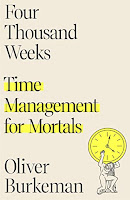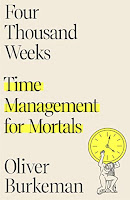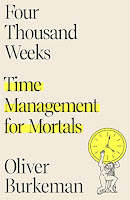In an earlier post, I said that Four Thousand Weeks may not be a time management book at all, but a time philosophy book. After finishing it, I think that is the case. It really isn't for people who are looking to manage their time so that they can reach a particular goal. It's for people who are looking to change themselves and how they think about life.
That is not a bad thing. It's not a good thing. It's just the focus of this particular book.
As I was reading Four Thousand Weeks, I sometimes made comparisons between what Burkeman was writing about and what I've read about minimalism. (Which has been on my mind recently, anyway.)
Burkeman's Time And Minimalism
- Burkeman says that many time management programs don't work, because they set users up to believe that using them will mean that at some point they will have time to do what they want. But that will never happen, because our personal and work obligations are infinite. There will always be more of them. A minimalist writer (I apologize for not recalling which one) claimed that organization programs for material things don't change the amount of time you have to commit to your material things. Instead of dealing with material things piled up around you, you're dealing with organizing them. Everything is still there, you've just shifted how you spend your time dealing with it.
- Burkeman says we'll be better off if we accept that we can't do everything, or maybe we can't do everything now. With minimalism, we believe we'll be better off if we accept that we can't have every material thing.
- At one point in Four Thousand Weeks, Burkeman writes that when we become distracted with something like social media, we pay for that time with hours of our life, the hours we could have been using to do something we value more. It was sort of a throwaway line. He didn't elaborate. I picked up on it in a big way, though, because one of the minimalist writers I've read says we pay for any material thing we purchase with hours of our lives, the hours it took to make the money to pay for the thing. That minimalist thought has kept beaucoup de crap from coming into my house. I have used Burkeman's thought about paying with hours of my life for social media to keep me off it during the workday.
Your "Four Thousand Weeks" Roundup
Here are the links to the Original Content posts on Four Thousand Weeks:
- I'm Starting A Book Arc! Oh, And Also, We're All Going To Die.
- The "Four Thousand Weeks" Read Part 2: Some history and, uh, brain science?
- The "Four Thousand Weeks" Read Part 3: Positive procrastination
- The "Four Thousand Weeks" Read Part 4: Procrastination is the solution to a problem
- The "Four Thousand Weeks" Read Part 5: Living in the moment
- The "Four Thousand Weeks" Read Part 6: Slowing down















